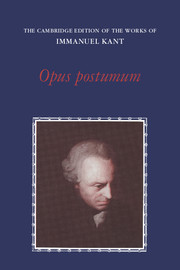Introduction
Published online by Cambridge University Press: 05 June 2012
Summary
Almost two centuries after Immanuel Kant's death, one of his major works is still virtually unknown in the English-speaking world; this in itself is remarkable and calls for an explanation. It cannot be explained entirely by the fact that Kant did not live to prepare the text for publication, leaving a stack of several hundred pages on his desk at the time of his death. For though unedited, the manuscript is not unfinished in the sense that its argumentation breaks off midway; rather, the train of thought running through it is brought to what seems to be a logical, if not fully worked out, conclusion.
Kant's literary executor, however, thought the text unfit for publication, with the result that it soon disappeared among the possessions of Kant's heirs. When it resurfaced half a century later, influential philosophers such as Kuno Fischer thought they could dismiss it without inspection, as a product of senility – after all, had not Kant himself completed the critical philosophy with his Critique of Judgment?
But more sympathetic thinkers, too, found it difficult to make sense of Kant's text, for the various sheets and fascicles of the manuscript were not preserved in the order of their composition, making it seem impossible to determine the chronological (and logical) order of his reasoning.
Nevertheless, an edition of the Opus postumum was begun in 1882 by Rudolf Reicke – only to come to an abrupt end two years later, when the manuscript was sold by Kant's heir to an uncooperative buyer.
- Type
- Chapter
- Information
- Opus Postumum , pp. xv - xlviiPublisher: Cambridge University PressPrint publication year: 1993
- 2
- Cited by



